 Exit Interviews.
Exit Interviews.
You should do them when an employee leaves. Few companies do. Fewer do them correctly. Those that do, aren’t sure what to do with them.
Exit Interview – 3-Step Process
Does your business do exit interviews when employees leave your company? Verne Harnish, author of Scaling Up, Mastering the Rockefeller Habits, and Scaling Up Compensation shared three steps to make this a learning process for you.
The key is approaching with a mindset/tone that the interview is about learning.
Here are the three steps:
- What is the reason(s) you are leaving (ask a what, not a why question -- why questions feel accusatory).
- Ask the famous Q12 questions from Gallup to gain more specifics. (These Employee Engagement Questions we recommend doing with your team on at least an annual basis)
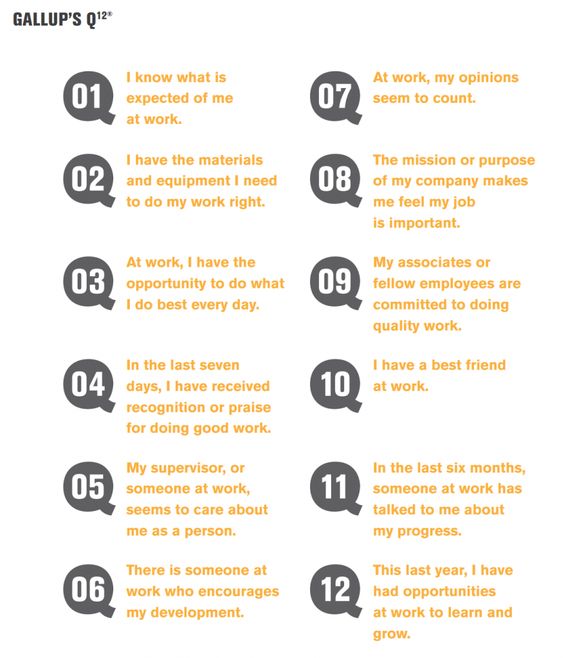
- Last, ask them to provide input helpful to the overall firm – “what do you think/feel XYZ corp. should start, stop, and keep doing.” Asked separately, these questions are always golden -- open-ended and end on a positive note.
Wish them well in their next career and if an important relationship you want to maintain, keep them on a customer distribution list of announcements. In addition, you can follow up and let them know if the company made any changes based on their feedback.
Closing the loop is always advised – and turns them into advocates instead of distractors.
Why Don’t You Do Exit Interviews
I’m curious to discover why your company doesn’t do exit interviews. (Leave a comment at the end of this blog for or against please!)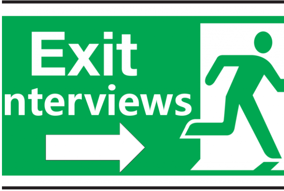
There are many reasons not to, involving fear of what you might find out, confronting a disgruntled employee, or possibly discovering an issue with a current employee you were unaware of.
Quite frequently it’s the lack of time or not having a process to follow.
Many companies make this process optional, and those who do frequently have them fill it out by themselves rather than conducting a private interview. (Conducting an in-person interview removes ambiguity, shows the person you’re sincere in your interest to learn, and finally gains clarity.)
I know there are reasons not to exit interview every employee. If you didn’t give them much attention when they worked for you, why would you give them attention when they leave?
Is this an indictment of your work environment?
All the reasons you don’t conduct an exit interview are exactly why you should, of course. Is your business interested in having better retention, better performance, and more engaged employees?
The Great Resignation is making it more difficult to do these interviews. They are necessary to prevent your business from sliding further in employee engagement and retention.
Evaluate Exit Interviews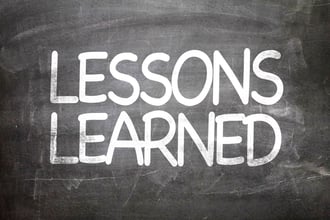
Critical to your culture and your managers are reviewing the results. When losing a key player, it makes sense to invest time with the manager and have your HR person also exit interview them. You might immediately review the results with the manager to discover what they might have done differently to keep the employee. It may reveal a soft skill to work on to develop managerial skills, like listening.
Exit interviews should be collected, analyzed, shared with the Leadership team, and reviewed with each manager as part of their ongoing performance reviews or development process.
Every elite athlete learns from each performance. They review the tape, ask for help when they’re slumping, and get coached up. They practice improving their performance to elevate their game. Your business needs to recognize how valuable exit interviews are to help grow your managers and your culture.
Evaluate Your Culture & Your Managers
People don’t leave companies. They leave managers. (For a twist on this Read Why People Really Quit Their Jobs, which really reinforces Marcus Buckingham’s Nine Lies About Work).png?width=603&name=Nine%20Lies%20%26%20Truths%20About%20Work%20(Marcus%20Buckingham).png)
One of my customers made developing their managers their annual goal. It stands to reason to retain and perform better, good to great managers help you will retain your team and elevate performance.
Having great managers also builds your culture. When you evaluate your managers it’s important to rank them in terms of A Players on their team: how many do they retain, how many do they develop, and how many do they hire?
 Culture Eats Strategy for Lunch. To scale your business, no strategy or execution will continue to successfully grow your business without a harmonious culture of accountability.
Culture Eats Strategy for Lunch. To scale your business, no strategy or execution will continue to successfully grow your business without a harmonious culture of accountability.
To create an environment where everyone is inspired to give their best, contact Positioning Systems today to schedule a free exploratory meeting.
Growth demands Strategic Discipline.
Michael Porter defined strategy as the creation of a unique and valuable position, involving a different set of activities. Play Bigger: How Pirates, Dreamers, and Innovators Create and Dominate Markets, defines how companies like Amazon, Apple, Google, Birds Eye, 5-hour Energy, and Pixar create markets by becoming Category Kings.
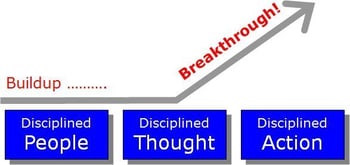 Building an enduring great organization requires disciplined people, disciplined thought, disciplined action, superior results, producing a distinctive impact on the world.
Building an enduring great organization requires disciplined people, disciplined thought, disciplined action, superior results, producing a distinctive impact on the world.
Discipline sustains momentum, over a long period of time, laying the foundations for lasting endurance.
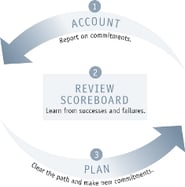 A winning habit starts with 3 Strategic Disciplines: Priority, Metrics, and Meeting Rhythms. Forecasting, accountability, individual, and team performance improve dramatically.
A winning habit starts with 3 Strategic Disciplines: Priority, Metrics, and Meeting Rhythms. Forecasting, accountability, individual, and team performance improve dramatically.
Meeting Rhythms achieve a disciplined focus on performance metrics to drive growth.
Let Positioning Systems help your business achieve these outcomes on the Four most Important Decisions your business faces:
|
DECISION |
RESULT/OUTCOME |
|
PEOPLE |
|
|
STRATEGY |
|
|
EXECUTION |
|
|
CASH |
|
Positioning Systems helps mid-sized ($5M - $250M+) businesses Scale-UP. We align your business to focus on Your One Thing! Contact dwick@positioningsystems.com to Scale Up your business! Take our Four Decisions Needs Assessment to discover how your business measures against other Scaled Up companies. We’ll contact you.
NEXT BLOG – Should You Play Bigger – Category is the New Strategy






.jpeg?width=150&height=135&name=Hand%20with%20marker%20writing%20the%20question%20Whats%20Next_%20(1).jpeg)

